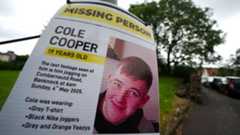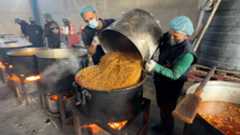Zelensky warns against giving away territory as latest Ukraine talks end

- Published
Ukraine's President Volodymyr Zelensky has welcomed "important steps" made at talks with the US in Geneva on ending the war with Russia but warned the "main problem" remained Vladimir Putin's demand for legal recognition of Russian-occupied territory.
US and Ukrainian officials met on Sunday to discuss a 28-point peace plan drafted by American and Russian officials in October, which caused consternation in Kyiv and among its European allies.
It appears the Europeans drafted counter-proposals after rejecting parts of the plan which favoured Russia's war aims.
It is thought that Zelensky and US President Donald Trump will meet to discuss the more contentious points but no timeline was given.
The question of territorial integrity in particular is a key point of divergence between Russia and Ukraine. Zelensky has repeatedly said Moscow should not be rewarded for its aggression with land it seized by force, and that doing so would create a dangerous precedent.
Following the end of the talks in Geneva, Trump suggested on social media that "something good just may be happening" but with the caveat: "Don't believe it until you see it."
Russian representatives did not take part in the meeting in Switzerland and the Kremlin said it had not received any information on the outcome of the discussions. Spokesman Dmitry Peskov noted Moscow was aware that "adjustments" had been made to the plan that had initially been welcomed by Putin.
That 28-point peace plan was drafted by US and Russian officials in October and presented to Ukraine last week. Several of its elements seemed heavily geared towards Moscow's longstanding demands.
Comments by Trump which suggested Ukraine had until Thursday to accept the deal or face serious cuts in US support contributed to creating a sense of urgency across Europe and talks between Ukraine and US officials were hastily convened.
By Sunday evening US Secretary of State Marco Rubio said a "tremendous" amount of progress had been made at the talks. "I honestly believe we'll get there," he said.
But some European leaders have been more cautious. "I am not sure if we are closer to peace," Polish Prime Minister Donald Tusk said, while German Chancellor Friedrich Merz said discussions would be a "lengthy, long-lasting process" and that he did not expect any breakthroughs this week.
Europeans were left scrambling for a seat at the table last week, after they were seemingly caught unawares when the US draft peace plan was presented.
A counter-proposal - reportedly drafted by Britain, France and Germany - excluded any recognition of Russian-held regions, raised Ukraine's allowed army size and left the door open to Ukraine joining Nato.
Rubio said he was not aware of the plan and on Monday Kremlin foreign policy aide Yuri Ushakov rubbished it as "completely unconstructive".
Since launching its full-scale invasion of Ukraine in 2022, Russia has consistently demanded full Ukrainian withdrawal from the whole of the eastern Donbas, made up of Donetsk and Luhansk regions.
The28-point plan presented last week would have Ukrainian forces withdraw from the part of Donetsk they currently control. That area would become a neutral demilitarised buffer zone "internationally recognised as territory belonging to the Russian Federation".

This arrangement too would be difficult to accept for Ukraine. Kyiv and its European partners are wary of any settlement which jeopardises the principles of territorial integrity and sovereignty - and Zelensky has repeatedly warned that giving up the Donbas would leave Ukraine vulnerable to Russian attacks in the future.
Another key Russian demand is for Ukraine to never become part of Nato. But Kyiv sees membership of the alliance as the only way to protect itself from future attacks - and joining Nato is enshrined in the Ukrainian constitution.
Despite last week's frenzied diplomacy the next steps in the process are unclear.
The expectation is that Zelensky will soon personally speak to Trump, after which a new draft peace plan will be eventually presented to Moscow. There were no plans for a meeting this week between Russian and US negotiators, the Kremlin said.
British Prime Minister Sir Keir Starmer said there was still work to do for a "just and lasting peace" in Ukraine. A virtual "coalition of the willing" meeting will take place on Tuesday to discuss developments, he added.
Related topics
- Published1 day ago

- Published7 hours ago













